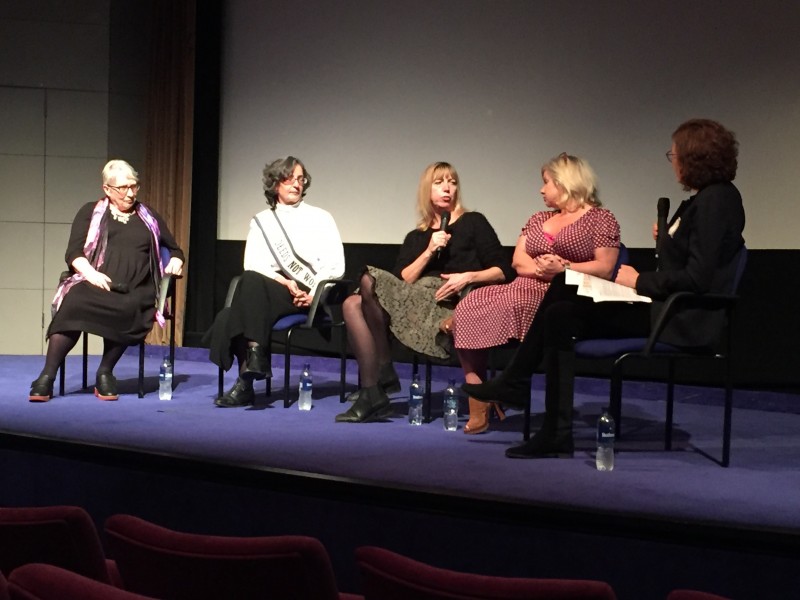By Susan Watts
It was an evening designed to inspire. This was a chance to celebrate the first five years of the CSC’s Suffrage Science scheme, which aims to encourage women into science, and to stay there. With Helen Pankhurst involved, it was also a chance to explore the role of activism today, and the changing nature of women’s activism since her great grandmother’s time as a Suffragette.
The evening, hosted by the Tricycle theatre in North London, began with a screening of Suffragette the film. The film features Carey Mulligan, Helena Bonham Carter, Meryl Streep and others in a frank portrayal of the fight for Votes for Women. It was a powerful reminder of the lives and cause of those who gave the Suffrage Science scheme its name, and an uncomfortable watch. Historical details, such as the Cat and Mouse Act, are portrayed in unflinching detail. Hunger-striking women in prison are shown being force-fed, then released as they approach dangerous levels of starvation and re-arrested once they’ve been outside long enough to become well again.
Before the film I sat down with Helen, and we talked about her famous Pankhurst predecessors and how they might view today’s activists; about who inspires her and about whether she sees signs of activism in science and medicine today.
“I think the whole of science is about activism. It’s about looking at a particular discipline and pushing the boundaries of what that discipline can deliver – and often it’s about the relationship between science and humanity and what science can do in terms of changing the world that we humans live in. So to the extent that it enables society to benefit in a hundred ways, that is activism.
I think the whole of science is about activism. It’s about looking at a particular discipline and pushing the boundaries of what that discipline can deliver
“I also think that scientists often are at the back of our thinking about objectivity and that’s a really important element that all scientists can bring to any form of activism, because it’s easy to knock on the head and dismiss some activism if you don’t have hard figures behind it.”
“Women scientists can put their mark on the world in a way that is affecting change and change in a more gendered way – so if we only have scientists who are men then it’s a particular eye on the world that gets changed – if we have women scientists involved and actively so – then their engagement in that relationship between science and humanity is to the benefit of all of us…”
Helen said the Suffrage Science scheme, initiated by Amanda Fisher, director of the CSC, could play a strong role in keeping a flashlight in place on issues such as gender and activism in science. “If we make a noise and make it visible, we can hope for change that way.”

Suffrage Science panellists: Uta Frith, Helen Pankhurst, Krista Cowman and Alison Owen with writer and broadcaster Vivienne Parry.
After the screening, Helen Pankhurst joined a panel of four to discuss the making of the film and women’s activism more broadly. Helen currently campaigns on behalf of the aid organisation Care International, which supports access to education for girls and women across the world. The other panellists comprised neuroscientist and Suffrage Science awardee Uta Frith, historian and Suffragette adviser Krista Cowman and Suffragette producer Alison Owen, with writer and broadcaster Vivienne Parry in the chair.
During the discussion, representatives of 50:50 Parliament, which campaigns for equal representation of women and men at Westminster, said it was refreshing to watch a film with so many powerful roles for women.
Alison Owen was asked about quotas in the film industry. She said that she’s strongly in favour of these, because the current situation is so skewed against women’s voices. Though it’s not an ideal step to take, it’s a necessary one, she argued. Asked if women might be taken less seriously if appointed through quotas, she said: “frankly I don’t care … we just need more of them.”
Helen Pankhurst delivered what was arguably the most memorable quote of the night. She was asked about the shock some might feel when confronted by the violence of some of the Suffragettes’ actions. She replied by saying that they’d used violence against property and not people, adding: “militancy is uncomfortable only for the privileged.”
By the evening’s end I had the impression that many of those who’d joined us felt something akin to the eight-word trailer that promotes the Suffragette film… “Inspired by the Women who Inspired the World.”
For further information contact
Susan Watts
Head of Communications and Public Engagement
07590 250 652
0208 383 8247
